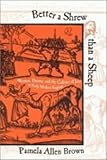Better a Shrew than a Sheep : Women, Drama, and the Culture of Jest in Early Modern England / Pamela Allen Brown.
Material type: TextPublisher: Ithaca, NY : Cornell University Press, [2018]Copyright date: ©2003Description: 1 online resource (280 p.) : 14 halftonesContent type:
TextPublisher: Ithaca, NY : Cornell University Press, [2018]Copyright date: ©2003Description: 1 online resource (280 p.) : 14 halftonesContent type: - 9781501722363
- Comic, The, in literature
- English drama (Comedy) -- History and criticism
- English drama -- 17th century -- History and criticism
- English drama -- Early modern and Elizabethan, 1500-1600 -- History and criticism
- English wit and humor -- History and criticism
- Jestbooks, English -- History and criticism
- Jestbooks, English -- History
- Sex role in literature
- Women and literature -- England -- History -- 16th century
- Women and literature -- England -- History -- 17th century
- Women in literature
- Gender Studies
- Literary Studies
- LITERARY CRITICISM / European / English, Irish, Scottish, Welsh
- 822/.309352042 23
- PR658.W6 B76 2003eb
- online - DeGruyter
| Item type | Current library | Call number | URL | Status | Notes | Barcode | |
|---|---|---|---|---|---|---|---|
 eBook
eBook
|
Biblioteca "Angelicum" Pont. Univ. S.Tommaso d'Aquino Nuvola online | online - DeGruyter (Browse shelf(Opens below)) | Online access | Not for loan (Accesso limitato) | Accesso per gli utenti autorizzati / Access for authorized users | (dgr)9781501722363 |
Frontmatter -- Contents -- Illustrations -- Acknowledgments -- Introduction Sauce for the Gander -- 1. Near Neighbors, Women's Wars, and Merry Wives -- 2. Ale and Female: Gossips as Players, Alehouse as Theater -- 3. Between Women, or All Is Fair at Horn Fair -- 4· "O such a rogue would be hang'd!" Shrews versus Wife Beaters -- 5. Scandalous Pleasures: A Coney-Catcher and Her Public -- 6. Griselda the Fool -- Epilogue: The Problem of Fun -- Bibliography -- Index
restricted access online access with authorization star
http://purl.org/coar/access_right/c_16ec
In a study that explodes the assumption that early modern comic culture was created by men for men, Pamela Allen Brown shows that jest books, plays, and ballads represented women as laugh-getters and sought out the laughter of ordinary women. Disputing the claim that non-elite women had little access to popular culture because of their low literacy and social marginality, Brown demonstrates that women often bested all comers in the arenas of jesting, gaining a few heady moments of agency. Juxtaposing the literature of jest against court records, sermons, and conduct books, Brown employs a witty, entertaining style to propose that non-elite women used jests to test the limits of their subjection. She also shows how women's mocking laughter could function as a means of social control in closely watched neighborhoods. While official culture beatified the sheep-like wife and disciplined the scold, jesting culture often applauded the satiric shrew, whether her target was priest, cuckold, or rapist. Brown argues that listening for women's laughter can shed light on both the dramas of the street and those of the stage: plays from The Massacre of the Innocents to The Merry Wives of Windsor to The Woman's Prize taught audiences the importance of gossips' alliances as protection against slanderers, lechers, tyrants, and wife-beaters. Other jests, ballads, jigs, and plays show women reveling in tales of female roguery or scoffing at the perverse patience of Griselda. As Brown points out, some women found Griselda types annoying and even foolish: better be a shrew than a sheep.
Mode of access: Internet via World Wide Web.
In English.
Description based on online resource; title from PDF title page (publisher's Web site, viewed 26. Apr 2024)


